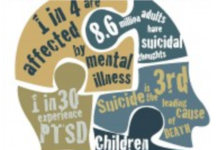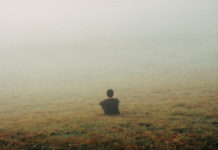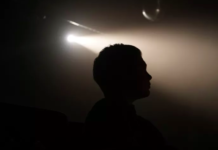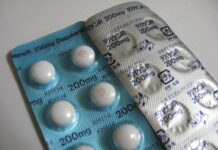Existential Therapy Assists Patients Withdrawing From Psychiatric Drugs
Confronting existential anxiety through “Basal Exposure Therapy” shows promising results in people withdrawing from psychotropic drugs.
To Live and (Almost) Die in L.A.: A Survivor’s Tale
After 25 years of chronic emergency, 22 mental hospitalizations, a stint at a “community mental health center,” 13 years in a "board & care," repeated withdrawals from addictions to legal drugs, and a 12-year marriage, I plan to live every last breath out as a survivor, an advocate, and an artist.
Certain Antihypertensive Drugs Linked to Mood Disorders
A new study suggests that some antihypertensive drugs are associated with increased risk of bipolar disorder and depression, while other antihypertensive drugs are actually associated with decreased risk.
Study Finds High Risk for Suicide Following Psychiatric Hospitalization
Patients are at an increased risk for suicide during the three months immediately following discharge from an inpatient psychiatric hospital.
Polypharmacy/Bipolar illness
A. Bipolar Illness Before the Psychopharmacology Era
Prior to 1955, bipolar illness was a rare disorder. There were only 12,750 people hospitalized with that disorder...
Shock Device Safe As Eyeglasses? 89 Days to Say No
We now have only 89 days to respond to Docket No. FDA-2014-N-1210. Tell the FDA no to the down-classification of shock devices. Tell the FDA exactly how subjective and damaging the terms “treatment-resistant” and “require rapid response” are, and how they fail as legitimate medical concepts. The known risks of electroshock should not be ignored because one has been psychiatrically labeled.
What If We Are All Wrong About Mental Illness?
From Thoughtful Living: The biomedical model of psychiatry, along with the DSM, is deeply flawed and can often be misleading. To improve, mental health services...
Study Explores Meanings of Bipolar Disorder to Those Diagnosed
The narratives about Bipolar Disorder promoted by drug companies may influence how those diagnosed understand themselves.
Could ‘Treatment Resistance’ be an Effect of Antidepressants?
Previously taking antidepressants could make individuals less likely to respond to treatment for bipolar II depression.
SSRI Antidepressants Increase Surgery Risks
There is accumulating evidence that taking SSRI antidepressants increases the risk of bleeding and other complications during surgery, according to a review published in the British Journal of Anaesthesia.
Bipolar Disorder: Childhood Trauma Modulates Impact
From Psychiatry Advisor: Childhood trauma modulates the effects of bipolar disorder on the amygdala and hippocampus; it is associated with increased volumes of gray matter.
"'Childhood maltreatment has...
Changing Mental Health, One Published Case Report At A Time
Lifestyle interventions are the only corrective measures that are sufficiently complex to resolve the stress response factors that drive pathology. This case draws from twenty years of published scientific literature on psychoneuroimmunology and the connection between the gut, immune system, endocrine system, and the brain.
Study Privileges the Voices of Persons Hospitalized Against Their Will
How people are treated after being hospitalized can either help them to overcome the traumatic effects of coercion or make them worse.
New Research Documents Widening Mortality Gap for Bipolar and Schizophrenia
Analysis of longitudinal data from 2000-2014 demonstrate mortality gap is widening between persons with a diagnosis of bipolar or schizophrenia compared to the general population
Childhood Trauma Linked to Bipolar Diagnosis, Symptoms
Research on a sample of 587 patients with DSM-IV defined bipolar disorder finds that an earlier age at onset of bipolar illness - along...
The Shamanic View of Mental Illness
From UPLIFT: In the shamanic view, emotional distress and psychosis signal a spiritual awakening or emergence, not a pathology. Western cultures can learn a great...
U-M Team Concludes Bipolar Disorder Has Many Causes
From Science Magazine: After studying over 1,100 individuals diagnosed with bipolar disorder for 12 years, a University of Michigan research team has found that no...
Study Suggests Mania More Common in Psychosis When Antidepressants Used
A prospective cohort study of those labeled high risk for psychosis finds a higher prevalence of antidepressant use among those who develop manic symptoms.
What Happens When You Stop Taking Psychiatric Medications
From Pacific Standard: A new study surveyed people who have come off psychiatric medications to come up with information doctors can use to help support their...
Abilify: The Drug That Could Gamble Your Life Away
On this episode of America's Lawyer, Mike Papantonio discusses the numerous lawsuits pending involving the anti-psychotic drug Abilify, which has caused plaintiffs to develop serious...
Researchers Probe Connections Between Physical Activity and ‘Severe Mental Illness’
How does physical activity affect people diagnosed with bipolar, schizophrenia and major depressive disorders?
My Response to the FDA’s ECT Rule Change
I lived through forced ECT from 2005-2006 at the Institute of Living in Hartford, Connecticut. My experience with ECT was the impetus for me to become involved in the antipsychiatry and Mad Pride movements, although I am not entirely opposed to voluntary mental health treatment. The following is the comment I submitted to the FDA on its proposal to down-classify the ECT shock device.
Yes, Your Sleep Schedule is Making you Sick
From The New York Times: Clinicians have long known that sleep schedules and levels of exposure to sunlight can have a significant impact on...
Anticonvulsant Implicated in Birth Defects in up to 4,100 Children, French Study Finds
Between 2,150 and 4,100 children suffered from severe malformations connected to valproate prescription.
Childhood Bipolar Disorder More Rare Than Previously Claimed, Study Finds
Re-examination of meta-analytic claims finds the prevalence of pediatric bipolar disorder is close to zero.





























